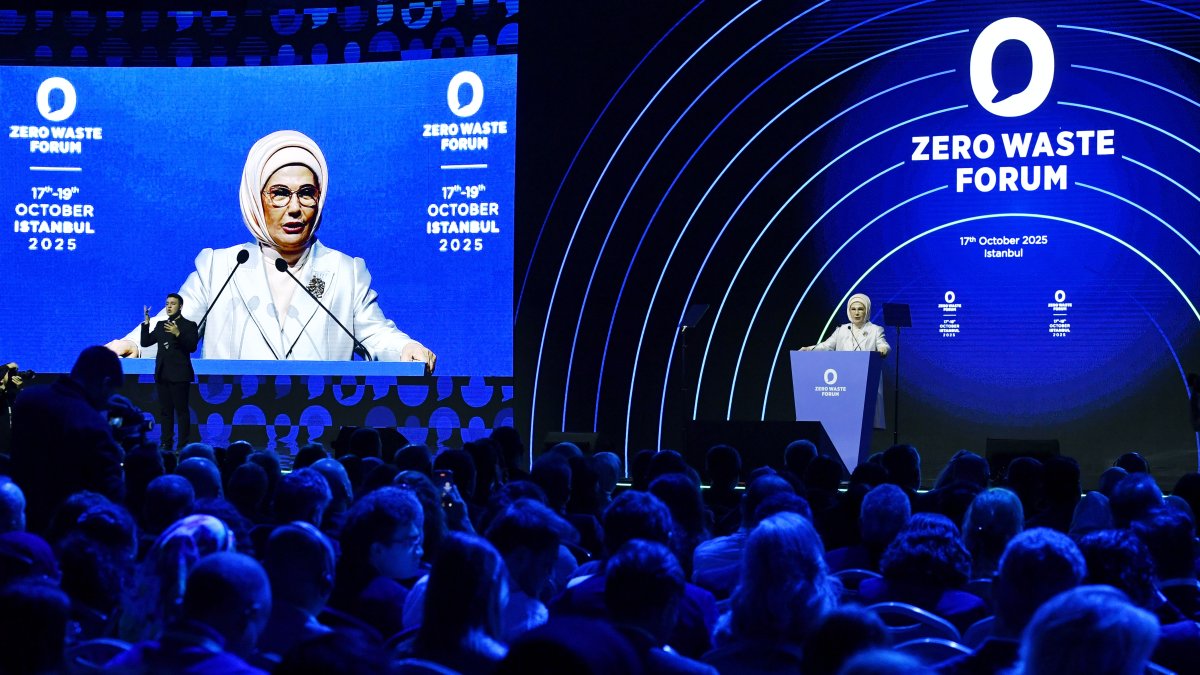Global change starts at home: Global Zero Waste Forum 2025 | Daily Sabah – Daily Sabah

Report on Türkiye’s Zero Waste Initiative and its Contribution to Global Sustainable Development Goals
Introduction: A Framework for Sustainable Action
Global consumption patterns and climate change present irreversible challenges, elevating environmental issues to a primary position on the international agenda. In response, Türkiye has developed a comprehensive environmental policy, with the Zero Waste Project, initiated in 2017 under the patronage of first lady Emine Erdoğan, emerging as a significant global movement. This initiative directly addresses multiple Sustainable Development Goals (SDGs) by promoting responsible consumption, climate action, and sustainable communities.
Türkiye’s Zero Waste Movement: National Implementation and SDG Alignment
Program Objectives and Philosophy
Launched in 2017, the Zero Waste movement has fundamentally reshaped environmental policy and practice in Türkiye. The initiative is founded on the principle that sustainable living is an ethical and moral responsibility, drawing upon Anatolian cultural traditions of resourcefulness and repair. This philosophy promotes a circular economy model, directly contributing to the achievement of SDG 12 (Responsible Consumption and Production) by moving beyond mere recycling to encompass waste prevention and reuse.
Measurable Impacts on Sustainable Development
The program has yielded significant, quantifiable results that align with key SDG targets:
- SDG 12 (Responsible Consumption and Production): The national recycling rate has increased from 13% to 36%, demonstrating substantial progress toward Target 12.5, which aims to reduce waste generation through prevention, reduction, recycling, and reuse.
- SDG 11 (Sustainable Cities and Communities): To date, 74.5 million tons of waste have been recovered, contributing to Target 11.6 by reducing the adverse environmental impact of cities through improved waste management.
- SDG 14 (Life Below Water): The collection of approximately 285,000 tons of marine debris directly addresses Target 14.1, which focuses on preventing and significantly reducing marine pollution.
- Economic Sustainability: The initiative has generated an economic contribution of 256 billion Turkish lira, supporting sustainable economic growth.
Global Expansion and Multilateral Cooperation
United Nations Recognition and Global Partnerships
The Zero Waste movement’s global significance was formally recognized in 2022 through a Goodwill Declaration from U.N. Secretary-General Antonio Guterres and the adoption of a Zero Waste resolution by the U.N. General Assembly, supported by 105 countries. This international endorsement underscores the initiative’s role in fostering SDG 17 (Partnerships for the Goals). Institutions such as the Zero Waste Foundation and the U.N. Advisory Board are now actively working to scale up these practices globally.
The Global Zero Waste Forum
The Global Zero Waste Forum, held in Istanbul from October 17-19, 2025, served as a platform to advance the global sustainability agenda. Organized under the theme “People, Place, Transformation,” the forum brought together participants from 108 countries to strengthen multilateral cooperation. It functioned as a “living laboratory” for sharing practical solutions and transforming waste management challenges into opportunities for collaboration, further reinforcing SDG 17.
Environmentalism, Peace, and Justice: An Integrated Approach
Addressing the Environmental Impacts of Conflict
The forum highlighted the often-underestimated environmental consequences of conflict, framing the destruction in Gaza as a form of “eco-genocide.” The generation of 61 million tons of debris and the destruction of agricultural lands were cited as critical threats to both human well-being and ecosystems. This perspective links environmental protection with SDG 16 (Peace, Justice and Strong Institutions) and SDG 15 (Life on Land), asserting that ecological devastation undermines global peace and security.
The discussion emphasized that the environmental impacts of war reverse progress on SDG 13 (Climate Action) and affect the entire global ecosystem, making the Zero Waste movement an expression of international solidarity and shared responsibility.
Conclusion: A Model for Individual and Collective Action
The Zero Waste movement, originating in Türkiye, has become a global model for achieving a sustainable future. Its success demonstrates how targeted national policies can directly contribute to the 2030 Agenda for Sustainable Development. The initiative provides a clear call to action, emphasizing that individual and collective responsibility are essential for progress. Key practices promoted by the movement include:
- Turning organic waste into compost at home.
- Utilizing leftover food to minimize waste.
- Turning off idle electrical devices to conserve energy.
- Repairing broken items to extend their lifecycle and reduce consumption.
By integrating these simple actions into daily life, individuals and institutions can contribute to a global consciousness that advances environmental stewardship and ensures a sustainable legacy for future generations.
Analysis of Sustainable Development Goals in the Article
1. Which SDGs are addressed or connected to the issues highlighted in the article?
- SDG 11: Sustainable Cities and Communities: The article discusses Türkiye’s Zero Waste movement, which has transformed policymaking at local and national levels. This directly relates to improving waste management within cities and communities to make them more sustainable. The Global Zero Waste Forum in Istanbul, bringing together city leaders, further reinforces this connection.
- SDG 12: Responsible Consumption and Production: This is the most central SDG in the article. The entire “Zero Waste” philosophy is about changing consumption-based habits, reducing waste generation, and promoting recycling and reuse. The article highlights the movement’s success in increasing recycling rates and recovering waste, directly addressing sustainable consumption and production patterns.
- SDG 13: Climate Action: The article explicitly states that environmental issues, driven by climate change, are a top priority. The Zero Waste movement is presented as a response to the consequences of climate change, as waste management and recycling contribute to reducing greenhouse gas emissions.
- SDG 14: Life Below Water: The article directly addresses this goal by mentioning that “approximately 285,000 tons of marine debris have been collected” as part of the Zero Waste initiative. This action is a direct effort to combat marine pollution.
- SDG 16: Peace, Justice and Strong Institutions: The article connects environmental issues with conflict by discussing the “eco-genocide” in Gaza. It argues that wars cause massive ecological destruction (“61 million tons of debris”) that undermines ecosystems and progress in combating climate change, linking environmental health to peace and stability.
- SDG 17: Partnerships for the Goals: The global nature of the Zero Waste movement is emphasized throughout the article. It mentions the U.N. General Assembly’s adoption of the Zero Waste resolution supported by 105 countries and the Global Zero Waste Forum, which gathered participants from 108 countries, including city leaders, innovators, and private sector representatives, to foster multilateral cooperation.
2. What specific targets under those SDGs can be identified based on the article’s content?
- Target 11.6: By 2030, reduce the adverse per capita environmental impact of cities, including by paying special attention to air quality and municipal and other waste management. The article’s focus on the Zero Waste movement’s impact on national and local policymaking and its success in waste recovery and recycling directly contributes to this target.
- Target 12.5: By 2030, substantially reduce waste generation through prevention, reduction, recycling and reuse. This is the core objective of the Zero Waste movement described in the article. The text provides specific statistics on increased recycling rates and waste recovery, showing direct progress toward this target.
- Target 12.8: By 2030, ensure that people everywhere have the relevant information and awareness for sustainable development and lifestyles in harmony with nature. The article highlights the role of the Zero Waste Foundation and the U.N. Advisory Board in disseminating best practices and raising awareness, as well as the movement’s emphasis on individual responsibility and cultural change.
- Target 14.1: By 2025, prevent and significantly reduce marine pollution of all kinds, in particular from land-based activities, including marine debris and nutrient pollution. The specific mention of collecting 285,000 tons of marine debris is a direct action aligned with this target.
- Target 17.16: Enhance the global partnership for sustainable development. The article details the international recognition and cooperation surrounding the Zero Waste movement, including the U.N. resolution supported by 105 countries and the Global Zero Waste Forum, which serves as a platform to share knowledge and strengthen multilateral cooperation.
- Target 17.17: Encourage and promote effective public, public-private and civil society partnerships. The Global Zero Waste Forum is described as a “meeting of wills” that brings together “city leaders and innovators to community volunteers and private sector representatives,” perfectly illustrating the multi-stakeholder partnerships this target aims to foster.
3. Are there any indicators mentioned or implied in the article that can be used to measure progress towards the identified targets?
- National Recycling Rate: The article provides a clear indicator for Target 12.5, stating that “the recycling rate has increased from 13% to 36%.” This is a direct measure of progress in national recycling efforts.
- Tons of Material Recovered: The article mentions that “74.5 million tons of waste recovered to date.” This quantitative data serves as an indicator for waste management efficiency and progress towards Target 12.5.
- Economic Contribution of Recycling: An economic indicator is provided with the statement, “The economic contribution amounts to 256 billion Turkish lira,” which measures the financial benefits of waste recovery and recycling activities.
- Amount of Marine Debris Collected: For Target 14.1, the article specifies that “approximately 285,000 tons of marine debris have been collected,” serving as a direct indicator of efforts to reduce marine pollution.
- Scale of Global Partnership: The article implies indicators for Target 17.16 by citing the number of countries involved in key initiatives: the U.N. resolution was “supported by 105 countries,” and the Global Zero Waste Forum had “participants from 108 countries.”
- Environmental Impact of Conflict: An indicator for the environmental damage caused by war (related to SDG 16) is implied when the article mentions the “61 million tons of debris” in Gaza, framing it as a measure of “eco-genocide.”
4. Summary Table of SDGs, Targets, and Indicators
| SDGs | Targets | Indicators Identified in the Article |
|---|---|---|
| SDG 11: Sustainable Cities and Communities | 11.6: Reduce the environmental impact of cities, especially in waste management. | The transformation of waste management policymaking at local and national levels. |
| SDG 12: Responsible Consumption and Production | 12.5: Substantially reduce waste generation through prevention, reduction, recycling and reuse. |
|
| SDG 13: Climate Action | 13.3: Improve education and awareness-raising on climate change mitigation. | The Zero Waste movement is framed as a response to climate change, with forums and foundations working to raise awareness. |
| SDG 14: Life Below Water | 14.1: Prevent and significantly reduce marine pollution, including marine debris. | Approximately 285,000 tons of marine debris collected. |
| SDG 16: Peace, Justice and Strong Institutions | 16.1: Significantly reduce all forms of violence (the article links the absence of peace to environmental destruction). | The concept of “eco-genocide,” with 61 million tons of debris generated from conflict in Gaza. |
| SDG 17: Partnerships for the Goals | 17.16 & 17.17: Enhance global and multi-stakeholder partnerships. |
|
Source: dailysabah.com
What is Your Reaction?
 Like
0
Like
0
 Dislike
0
Dislike
0
 Love
0
Love
0
 Funny
0
Funny
0
 Angry
0
Angry
0
 Sad
0
Sad
0
 Wow
0
Wow
0
















































































